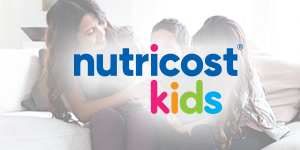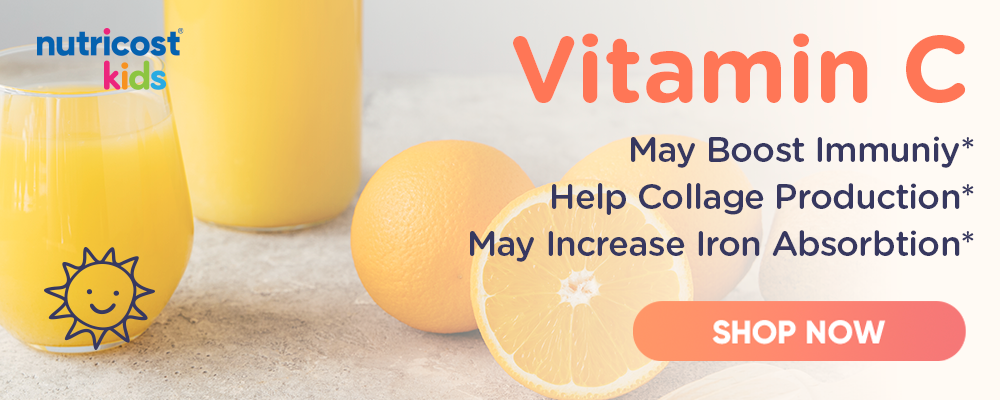Vitamin C! The Antioxidant Powerhouse Your Kids Need!

Vitamin C is a powerful antioxidant which protects our cells from harmful free radicals.
Unlike most animals, humans aren’t able to produce their own vitamin C. If we could then old-timey sailors wouldn’t have had to drink lime juice to keep from developing scurvy!
In our modern world, you might think that we’d have left problems like this in the past, but think again! One study suggests that as many as 14% of males and 10% of females in the United States are deficient in vitamin C.
So what does this mean for your kids?

Kids need more than just water, milk and juice!
When sailors got scurvy, they experienced extreme fatigue, bruising on their limbs, and pain in their gums. Sometimes their teeth even fell out! Now that’s a story to tell your child the next time they don’t want to finish their orange juice!
Vitamin C plays a vital role in gum health. If your child is like most, then they aren’t exactly keen on dental care. They eat too much sugar and get cavities as it is! Making sure they get enough Vitamin C is an easy way to make sure their little mouths are staying healthy!
Vitamin C also helps form and repair red blood cells, bones, and tissues. It strengthens your child’s blood vessels which can minimize bruising from all the tumbles they take! And this isn’t even to mention it’s benefits on your child’s immune system!
Unfortunately, many children are picky eaters. If they don’t eat enough fruits and vegetables, they might not be getting enough vitamin C! Fortunately, vitamin C supplements often come in chewable gummies which taste great!
They’ll never know it’s good for them!

3 Benefits of Vitamin C
Immunity
This is the one that made vitamin C famous. Feeling sick? Drink some lemon juice or, for a more enjoyable experience, try some lemon tea! This sort of folk wisdom is as old as the hills, but it’s true! In fact, a review of 31 studies found that consuming 1–2 grams of vitamin C daily reduced cold duration by 18% in children and 8% in adults!
Vitamin C encourages the production of white blood cells, also known as the disease killers of your body. Everytime your sick child sneezed in your face and you didn’t get sick, it’s because your white blood cells exterminated the disease before it could do any harm.
However, white blood cells are often inhibited by the presence of pesky free radicals. Free radicals are created from exposure to sun, secondhand smoke, and other environmental factors. Vitamin C is an antioxidant which means it can neutralize these free radicals and protect our white blood cells.

Healing
You’ve probably heard of collagen. Collagen is an essential component of our body tissue. It is the most abundant protein in the human body and one of the major building blocks of our skin, muscles, tendons, and ligaments. It’s even found in blood vessels, cornea, and teeth. The name “collagen” was even derived from a Greek word “kólla,” which means glue.
If that sounds important, it’s because it is. But did you know that vitamin C actually plays a key role in collagen production? You see, all collagen starts off as procollagen. Your body makes procollagen through a process which is reliant on vitamin C.

Iron Absorption
Here’s one you probably weren’t expecting! Unless you’re a dietician, you might not know that some types of iron are difficult for the body to absorb. Vitamin C, however, can help out in this process and produce greater absorption.
Iron is a mineral which is essential for growth and development, two things that kids do plenty of! Your body uses iron to make hemoglobin, a protein in red blood cells that carries oxygen from the lungs to all parts of the body, and myoglobin, a protein that provides oxygen to muscles.
People with low iron often report feeling tired and fatigued. You may be thinking, “I could stand for my children to be tired and fatigued every now and then,” but in your heart you know you want your kids to grow up big and strong. So make sure they’re getting their vitamin C!
Natural Sources of Vitamin C
So where does vitamin C come from? Here’s a handy list!
- Citrus fruits (Oranges, lemons, limes, grapefruit… you get the gist).
- Red and green pepper
- Kiwifruit: Also high in dietary fiber!
- Broccoli
- Cantaloupe
- Tomatoes
- Kale
It’s important to note that vitamin C in food is easily destroyed by heat, but since many good sources of the nutrient are fruits and vegetables, simply eating some of those foods raw is an easy way to reach the recommended intake.

How Much Vitamin C Does My Child Need?
The daily upper limits for vitamin C include intakes from all sources—food, beverages, and supplements—and are listed below:

The Punchline
Vitamin C is an essential vitamin for your children, especially during the winter months. It helps boost immune activity and promotes iron absorption while also healing wounds quickly. Don't let your child miss out on all these great benefits just because they're not getting enough Vitamin C!
Sources
https://pubmed.ncbi.nlm.nih.gov/23440782/
https://pubmed.ncbi.nlm.nih.gov/20515554/
https://ods.od.nih.gov/factsheets/VitaminC-HealthProfessional/
https://ods.od.nih.gov/factsheets/VitaminC-Consumer/
https://pubmed.ncbi.nlm.nih.gov/25157026/
https://www.ncbi.nlm.nih.gov/pmc/articles/PMC6678404/
https://pubmed.ncbi.nlm.nih.gov/23675073/
https://www.mayoclinic.org/drugs-supplements-vitamin-c/art-20363932
-
Posted in
Kids Health, Vitamin C










